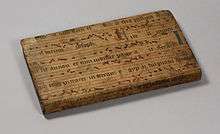Eirenaeus Philalethes
Eirenaeus Philalethes (the peaceful lover of truth) was a 17th-century alchemist and the author of many influential works. These works were read by such luminaries as Isaac Newton, John Locke, and Gottfried Wilhelm Leibniz. Newton's extensive writings on alchemy are heavily indebted to Philalethes, although Newton incorporated significant modifications as well.
Identity
The real identity behind the nom de plume of Eireneaus Philalethes was long shrouded in mystery. Recent research,[1][2] however, has shown that the author was George Starkey (1628-1665), an expatriate American living in London.
Works
| Library resources about Eirenaeus Philalethes |
| By Eirenaeus Philalethes |
|---|


First printings of Philalethes' tracts were published between 1654 and 1683:
- The Marrow of Alchemy, being an Experimental Treatise, Discovering the secret and most hidden Mystery of the Philosophers Elixer. London, UK. 1654. OCLC 607038829.
- Introitus apertus ad occlusum regis palatium (in Latin). Amstelodami: J. Janssonium. 1667. OCLC 883665686, 759830067, 776846193.
- Subsequently translated as:
- Secrets reveal'd; or, An open entrance to the shut-palace of the King : containing the greatest treasure in chymistry never yet so plainly discovered. London, UK: W. Godbid for William Cooper. 1669. OCLC 904722035.
- Three Tracts of the Great Medicine of Philosophers for Humane and Metalline Bodies (Amsterdam, 1668, in Latin; London, 1694, in English)
- The Art of the Transmutation of Metals
- A short Manuduction to the Caelestial Ruby
- The Fountain of Chymical Philosophy
- An Exposition upon Sir George Ripley's Epistle to King Edward IV (London 1677, in English)
- An Exposition upon Sir George Ripley's Preface (London 1677, in English)
- An Exposition upon the First Six Gates of Sir George Ripley's Compound of Alchymie (London 1677, in English)
- Experiments for the Preparation of the Sophick Mercury; by Luna, and the Antimonial-Stellate-Regulus of Mars, for the Philosophers Stone (London 1677, in English)
- A breviary of Alchemy, or a commentary upon Sir George Ripley's Recapitulation: Being A Paraphrastical Epitome of his Twelve Gates (London 1677, in English)
- An Exposition upon Sir George Ripley's Vision (London 1677, in English)
- Ripley Reviv'd, or an Exposition upon Sir George Ripley's Hermetico-Poetical Works (London 1678, in English)
- Opus tripartitum (London&Amsterdam, 1678, in Latin)
- Enarratio methodica trium Gebri medicinarum, in quibus contenitur Lapidis Philosophici vera confectio (Amsterdam, 1678, Latin)
- The Secret of the Immortal Liquor called Alkahest (London, 1683, English & Latin)
A number of these tracts, including the Three tracts and the Introitus were also included in the Musaeum Hermeticum of 1678.
All English works of Philalethes have been recently compiled in one volume.[3]
References
- ↑ Gehennical Fire: The Lives of George Starkey, an American Alchemist in the Scientific Revolution by William R Newman, University of Chicago Press, 2003 (ISBN 0226577147)
- ↑ Alchemy Tried in the Fire: Starkey, Boyle, and the Fate of Helmontian Chymistry by William R. Newman, Lawrence M. Principe, University of Chicago Press, 2002 (ISBN 0226577112)
- ↑ Alchemical Works: Eirenaeus Philalethes compiled, Cinnabar, 1994, ISBN 0-9640067-0-7
External links
- An Open Entrance to the Closed Palace of the King
- Metamorphosis of Metals
- Brief Guide to the Celestial Ruby
- Fount of Chemical Truth
- Secrets Reveal'd: or An Open Entrance to the Shut-Palace of the King 1669 edition at archive.org.